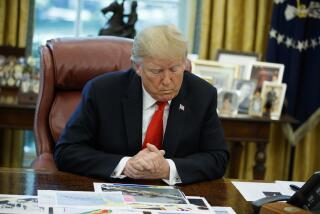Column: In the name of scientific ‘transparency,’ Pruitt’s EPA hobbles its own ability to regulate polluters
Say this for Scott Pruitt, the embattled administrator of the Environmental Protection Agency: He’s immune to irony.
Pruitt demonstrated that quality Tuesday by announcing a rule to enhance “transparency” at the EPA at a ceremony that was closed to the press. No wonder: The “transparency” rule he’s proposing would in fact limit his own agency’s ability to use the best science to make regulations. So why open the floor to questions?
Several efforts have been made in Congress to impose a similar rule. They’ve failed, so Pruitt is offering their sponsors, who include some of Capitol Hill’s most outstanding mouthpieces for the oil and gas industry and foes of open scientific inquiry, a backdoor route to the same goal.
This is weaponizing ‘transparency’ to stop the EPA in its tracks from doing its job.
— Yogin Kothari, Union of Concerned Scientists
Among them are Rep. Lamar Smith (R-Texas), one of the House’s preeminent climate change deniers. According to emails unearthed by the Union of Concerned Scientists through a Freedom of Information Act request, after Smith met with Pruitt in January, EPA staff began working on a process to “internally implement” the gist of Smith’s Honest and Open New EPA Science Treatment Act, which would hamstring the EPA’s use of scientific research. Smith’s “HONEST” Act passed the House last year, but was shunned by the Senate.
The measure’s goal was obvious, as is the EPA proposal: “This is weaponizing ‘transparency’ to stop the EPA in its tracks from doing its job,” Yogin Kothari of the Union of Concerned Scientists told me Tuesday.
The EPA rule hasn’t yet been published, but Pruitt offered a neat bit of misdirection at a signing ceremony broadcast on EPA’s video channel and YouTube. Pruitt was flanked by Smith and by GOP Sen. Mike Rounds of the oil and gas-producing state South Dakota, who recently dismissed questions about Pruitt’s ethics, which include ludicrous overspending on personal perks and suspect financial relationships with industry lobbyists, as “nitpicking.” Rounds was the Senate sponsor of Smith’s HONEST Act.
At the signing on Tuesday, Pruitt said the proposed regulation would ensure that “the science that we use is going to be transparent, it’s going to be reproducible, its going to be able to be analyzed by those in the marketplace … so that we can enhance confidence in our decision-making.”
That sounds unexceptionable. What’s wrong with rejecting science that’s “not transparent or reproducible,” as the HONEST Act decreed?
The answer, as Pruitt and the drafters of bills requiring disclosure of raw data and analytical methodologies well know, is that much of the scientific research important in developing regulations can’t be made public. Some of it is proprietary information belonging to scientists who developed it as part of their research. Some is personal information about human participants in studies underlying science-based rule-making.
Some isn’t “reproducible” because it’s derived from one-time events such as the 2010 Deepwater Horizon explosion and oil spill, or from conditions that one wouldn’t want to replicate. “You can’t ethically go back and redo studies on the impact of lead in drinking water on kids,” Kothari says, “or the impacts of smog over a 10-year span on folks in a community near a power plant. Those things just can’t be done.”
But that doesn’t mean the research is invalid — at least, not to legitimate scientists. Pruitt, Smith and Rounds, Kothari says, “are fundamentally misunderstanding and misrepresenting how science can and should be used in policymaking. This is actually a Trojan horse transparency proposal that would restrict the EPA’s ability to use science in its decisions.”
Pruitt is proposing to open his proposal to a short 30-day public comment period, although the comment and response period for rules with effects as far-reaching as this often last two or three years. That’s another aspect that swears at the notion that it’s all about “transparency.”
Pruitt made clear that he sees this stunt as a long-term legacy. “This is not a policy,” he said, “This is not a memo. This is a proposed rule. And the reason that’s important is because this is not something that may last for two months or two years. it is the codification of an approach.”
In other words, Pruitt may be gone in two months or two years, but he’s preparing for his assault on science to be felt for much longer.
Keep up to date with Michael Hiltzik. Follow @hiltzikm on Twitter, see his Facebook page, or email [email protected].
Return to Michael Hiltzik’s blog.
More to Read
Inside the business of entertainment
The Wide Shot brings you news, analysis and insights on everything from streaming wars to production — and what it all means for the future.
You may occasionally receive promotional content from the Los Angeles Times.











